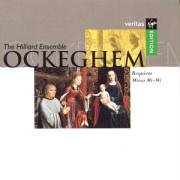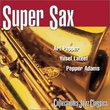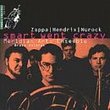| All Artists: Johannes Ockeghem, Hilliard Ensemble Title: Ockeghem: Requiem; Missa Mi-Mi Members Wishing: 0 Total Copies: 1 Label: Angel Records Release Date: 5/20/2000 Genre: Classical Styles: Opera & Classical Vocal, Chamber Music, Historical Periods, Classical (c.1770-1830) Number of Discs: 1 SwapaCD Credits: 1 UPC: 724356121928 |
Search - Johannes Ockeghem, Hilliard Ensemble :: Ockeghem: Requiem; Missa Mi-Mi
 | Johannes Ockeghem, Hilliard Ensemble Ockeghem: Requiem; Missa Mi-Mi Genre: Classical
The Hilliard Ensemble here gives one of the finest performances available of Ockeghem's Requiem, the oldest surviving setting of the Mass for the Dead. For all its melancholy tone, this Requiem has a good deal of light and... more » ![header=[] body=[This CD is available to be requested as disc only.]](/images/attributes/disc.png?v=a4e11020) ![header=[] body=[This CD is available to be requested with the disc and back insert.]](/images/attributes/disc_back.png?v=a4e11020) ![header=[] body=[This CD is available to be requested with the disc and front insert.]](/images/attributes/disc_front.png?v=a4e11020) ![header=[] body=[This CD is available to be requested with the disc, front and back inserts.]](/images/attributes/disc_front_back.png?v=a4e11020) |
Larger Image |
CD DetailsSynopsis
Amazon.com The Hilliard Ensemble here gives one of the finest performances available of Ockeghem's Requiem, the oldest surviving setting of the Mass for the Dead. For all its melancholy tone, this Requiem has a good deal of light and even lyricism, especially in the many imitative passage for two equal voices. The Missa Mi-mi is actually the more somber of the two works on this record--and the denser as well, with fuller scoring and a low vocal range. Maintaining the melodic momentum and interest in this Mass is more of a challenge than in the Requiem, and the Hilliard Ensemble doesn't always succeed; nevertheless, they capture the music's atmosphere well, and their tuning and ensemble are impeccable. (For a remarkable, if unusual, rendition of the Missa Mi-mi, try the Cappella Pratensis .) --Matthew Westphal Similar CDs
|
CD ReviewsRequiem at its best hcf | 12/24/1999 (5 out of 5 stars) "Requiem is not only Ockeghem's most famous work, it is also the earliest surviving polyphonic setting of the funeral mass. Scholars suggest that the work was not written all at once, and that, in fact, it may be a compilation of fragments from various Ockeghem's compositions. The work's widely diverging styles - ranging from ritualistic austerity that could almost be attributed to Dufay to complex polyphony that was characteristic of Ockeghem's later writing - is certainly responsible for this view. Ockeghem's Requiem has received two remarkable renditions. One is this recording by the Hilliard, and the other is the award-winning recording by the Clerks. With all due respect for the Clerks, I think that this Requiem from the Hilliard remains unsurpassed. I greatly admire the Clerks as a group (and they may well beat the Hilliard in some repertory), but when it comes to a work like Ockeghem's Requiem, I think the Hilliards are better suited vocally to do it full justice. One of the main characteristics of this work is its oscillation between solo and group sections. Some solo sections are gimmel duets, others combine two or three different ranges, but in each case the more unique each voice, the better the result. While the Clerks offer a remarkable blend of voices as a group, they cannot match the Hilliards in the beauty of individual voices. To hear the magical high tenor of RCC dancing together with the warm baritone of PH is to hear something that cannot be replicated. The upper voice duets are sung by DJ and M. Chance. Chance's participation removes some of the edge from the top line - a detail which, I'm sure, the detractors of DJ will be happy to know. The Hilliards complement Ockeghem's setting of Requiem with four plainchant sections. PH explains that this was done to complete the musical logic by fully unwinding the thread of chant that underlines the work. The disc also includes Missa Mi-Mi, which is notable for the absence of cantus firmus." High beauty indeed Leslie Richford | Selsingen, Lower Saxony | 01/11/2005 (5 out of 5 stars) "Johannes Ockeghem (ca. 1410 ? 1497) was one of the famous school of Flemish polyphonic composers in the late Middle Ages. Here, the Hilliard Ensemble have recorded two works known to us through copies kept in the Vatican library, the Requiem or Missa pro defunctis for two to four voices, and the mass known as ?Mi-mi? or Missa quarti toni. As the Requiem only has the first five movements, the Hilliards have complemented it with four short movements of Gregorian chant (a total of less than three minutes). Both masses are full of high beauty indeed, with most of the movements putting more stress on the lower voices rather than the alto countertenors; the Hilliards? usual countertenor David James is here joined by Michael Chance, whose exceptionally good voice is a pleasant surprise, but in the end it is Paul Hillier himself, together with the excellent Michael George (baritone/bass) who steal the show with some exquisite singing that, listened to in absolute silence and preferably in the dark, can inspire real devotion and joy (despite the sadness of the Requiem text). The recording was made at London?s Temple Church in September 1984, and obviously the engineers were more interested in catching the wonderful blend of the male voices rather than trying to make each individual voice stand out. The result is a sound which is certainly impressive, although I would hesitate to call this disc audiophile: If you are looking for that kind of sound quality in a Hilliard disc, you should try their recording of Machault?s mass for Hyperion (a recording made by Swedish specialist Robert van Bahr of BIS Records). This Ockeghem disc is just very good listening, although the digital recording is not absolutely perfect: Apart from the (inevitable?) footsteps on the stone church floor, there are some clicking noises during the Requiem and also some tape hissing that one has come to associate with analogue recordings (this is digital, but it doesn?t really sound like it). However that may be, Hilliard fans will love this disc, and it also provides a lovely gateway to late mediaeval music for newcomers. If, however, you think you would prefer female voices to countertenors, you may like to sample Ockeghem?s music in an interpretation by the Danish choir Musica Ficta, directed by Bo Holten (and published at budget-price by Naxos): their interpretation is not so strictly historical, but their singing is, in its way, also very beautiful. " A voice teacher and early music fan George Peabody | Planet Earth | 01/13/2007 (5 out of 5 stars) "OCKEGHEM USES UNIQUE VOCAL VARIETY AND SCORINGS IN HIS COMPOSITIONS THUS ENHANCING THE ENJOYMENT OF THE LISTENER.
Because most fifteenth century composers were singers by trade, their music is profoundly vocal in idiom and is characteristic of the style of the plainchant that was the aural background to their working life. Johannes Ockeghem (born in 1410), though probably in Flanders, spent most of his professional life (from 1543) in the employment of the French Royal Chapel. He was indeed an excellent example of the singer-composer of that period, being much praised by his contemporaries for his character as well as his voice and his music. His death in 1497, occasioned poems of tribute and lamentation from Guilliame Cretin, Erasmus and Jean Molinet. THE "MISSA 'Mi-Mi'" survives in three separate manuscripts in the Vatican Library. It is from the third manuscript, the Chigi Codex, that has been an important source of Ockeghem's music. The 'Requiem' is taken from that same manuscript. The title 'mi-mi' is assumed to be derived from the short motif appearing in the bass voice at the beginning of each main section, and consists of a falling fifth. Other than this short motif the "Missa 'mi-mi' is not known to be based upon any prior material, whereas most of the masses at that time were either 'parodies' of other compositions, sacred or secular, or were built around a 'cantus firmus'. Ockeghem foregoes this method of construction and extemporises an intricate, compelling web of sound out of the air.The movements are as follows: Introitus-Kyrie-Graduale-Offertorium-Sanctus & Benedictus(Gregorian Chant)-Agnus Dei (Gregorian Chant)-Communio(Gregorian Chant)-Postcommunio(Gregorian Chant). Ockeghem's 'REQUIEM' is the earliest existing polyphonic Requiem, and in it we find a diversity of techniques and vocal scorings that include many duets for high voice in strict imitaton , and is in a full rich style. The movements are: Kyrie-Gloria-Credo-Sanctus & Benedictus and Agnus Dei. Ockeghem did not compose huge quantities of music (some 10 masses, varied and individual mass movements, a handful of motets and 22 chansons), but what you hear on this recording are his 2 best works. They show at great length Ockeghem's ability to add new dimensions of harmonic coloring to enhance and emphasise an emotional direction in the music. Although I found both compositions enjoyable to hear, I was drawn over and over to the "Mi-mi", particularly to the lst,2nd,4th and 5th movements, which included many of the high voice duets mentioned earlier. Just extrordinary, and VERY WELL SUNG by the 2 countertenors Michael Chance and David James. The Hilliard Ensemble in this recording consists of 2 countertenors:Michael Chance & David James-3 tenors:Rogers C.Crump,Leigh Nixon &John Potter-l baritone:Paul Hillier and l bass: Michael George. All very skilled singers banded together to produce some really great music. I am so grateful that Chance is part of this ensemble (he isn't always), but his voice is so lovely that he actually manages to outsing David James, whose voice can get rather harsh and 'edgy' at times. It is truly an entertaining experience for the early music lover!" |

 Track Listings (14) - Disc #1
Track Listings (14) - Disc #1



